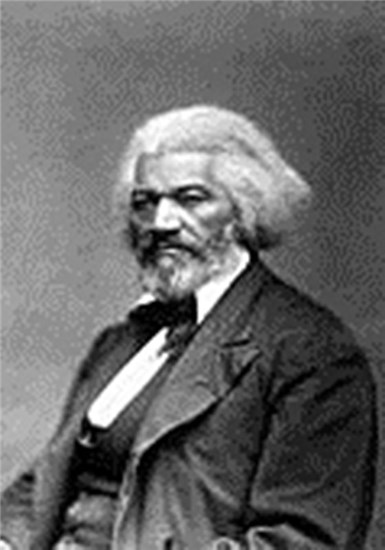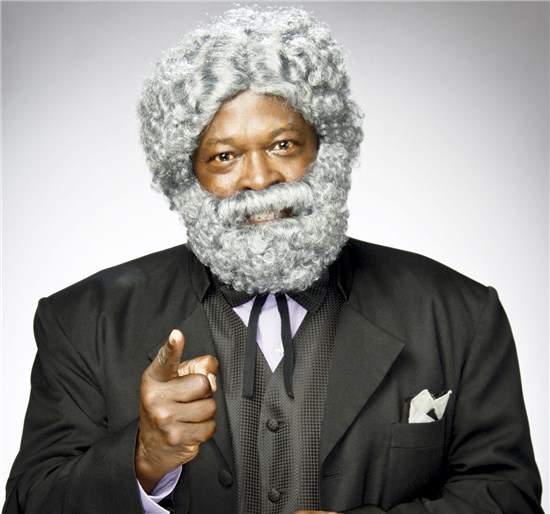

Frederick Douglass
by Bill Grimmette
In May of 1865, one month after the Confederate surrender at Appomattox and the assassination of Abraham Lincoln, abolitionist William Lloyd Garrison announced to the American Anti-Slavery Society that its work was done. He entertained a motion to disband the organization. Slavery, Garrison concluded, had been abolished with the signing of the Emancipation Proclamation and a victory over the Confederacy. The 13th Amendment to the Constitution had been passed by Congress but not yet ratified. Yet Garrison was content to move on. This position angered Frederick Douglass (a former Garrison protégé) and the freedmen abolitionists who vociferously denounced disbanding the Anti-Slavery Movement. They knew that to set people loose with no power to control their destiny was not freedom; it was a death knell. Douglass and his followers were successful in postponing dissolution of the organization, although many abolitionists fled its ranks with Garrison.
What Frederick Douglass and his slavery-survivors knew that Garrison and his followers did not fully appreciate was that slavery was not a shallow, cosmetic abrasion on the skin of the nation. It was, rather, a deeply rooted, wholly metastasized malignant cancer, with pedigrees as deep as bone marrow. Douglass compared it to a rattlesnake that shed its skin once a year as a cosmetic makeover while its poisons, fangs and striking-range were made deadlier by the day. To heal a nation thus plagued by slavery, Douglass expressed, could not be accomplished by narrow proclamations, lopsided compromises and sweet-sounding promises. Slavery had to be rooted out by an aggressive, surgical cut deep into the national bone, carving out the very marrow that sustained its growth. For this reason,Douglass intensified his connections with fierce anti-slavery senators Thaddeus Stevens and Charles Sumner to not just “rearrange the nation’s political deck-chairs” but rather to radically reconstruct the undergirding of this constitutional democracy so it could not just survive but actually thrive.
The underpinning of the slave tyranny, Douglass analyzed, was masterful. Its principal agency was divisiveness. Its primary tools were fear and suppression. Its suppression-points of subjugation were citizenship, education, health and wealth. Its main object was the majority white population, while its principal subject was the minority black population.
Slavers had learned through centuries of experimentation that to essentially control a majority you brutally and publically suppressed the minority. Their evilgenius was to elevate the image of the majority to a station of inherited superiority while denigrating the image of the minority to a standing of innate inferiority. So to reconstruct a system erected on such a simple, yet thorough foundation required raising the deflated prestige of the discriminately inferior while deflating without destroying the extravagant stature of the selectively superior. This task was much akin to balancing a barrel of nitro-glycerin on the head of a reed ina hurricane to keep it from exploding.
Yet, brave and courageous men and women undertook to resurrect the promise of the Preamble by boldly surging forward to rescript the scenes of the constitutional play with amendments 13, 14 and 15. Atop these structural changes thatstill hold to this very day, they built a bulwark of civil rights acts, Supreme Court interpretations and scholarly analyses that brought us, over time, to the epic of The Great Society.
Improvements wrought by Reconstruction were legion and the “New Birth of Freedom” prophesied by Lincoln was real, but not immaculate. This merely illustrates, as Frederick Douglass said, that while we remain human, being born again might make us better men but cannot make us Gods.
Recommended Reading
Foner, Phillip S.(Ed) & Taylor, Yuval (Adaptor).Frederick Douglass: Selected Speeches and Writings. Lawrence Hill Books, 1999.
Du Bois, W. E. B., Black Reconstruction in America: 1860-1880.Atheneum, NY, 1992.
Douglass, Frederick.Autobiographies.Library Classics of America, 1994. Comments by Henry Louis Gates, Jr.
McFeely, William S.Frederick Douglass. W. W. Norton & Company, Inc., 1991.
Foner, Eric.America’s Unfinished Revolution 1863-1877.Harper & Row, 1988.
Trefousse, Hans L. Thaddeus Stevens: Nineteenth-Century Egalitarian. Stackpole Books, 2001.
Noonan, John T. Jr. Narrowing the Nation’s Power: The Supreme Court Sides with the States.University of California Press, Ltd., 2002.
Dray, Phillip, At the Hands of Persons Unknown: The Lynching of Black America. Random House, 2002.
Bill Grimmette
Bill Grimmette is a master storyteller who performs professionally assensational characters of American history. He is past president of the National Association of Black Storytellers and a frequent performer at the Smithsonian Institutions. Bill has portrayed Chautauqua characters in the dramatic masques of Dr. Martin Luther King, Jr., Frederick Douglass, Benjamin Banneker, and W.E.B. Du Bois. Bill has appeared at High Plains Chautauqua as Banneker, Douglass and King and was last seen on this stage in 2009. Bill has a B.A. in Psychology from Marian college in Indianapolis, IN, an M.A. in Psychology from The Catholic University, in Washington DC and post-graduate credits in Education from George Mason University.
Frederick Douglass
-
Frederick Douglass declined an invitation from President Andrew Johnson to lead the Freedmen’s Bureau, but was selected to try to save the Freedman’s Savings and Loan Bank, which failed due to insufficient funding from Congress.
-
For a man with no schooling and for whom learning was an offense punishable by the lash and death, Frederick Douglass became renowned for his searing intellect. He wrote 3 books and over 3,000 newspaper articles, lectures and speeches and earned great wealth through public speaking.
-
During the Civil War, Abraham Lincoln asked Frederick Douglass to form a mission to go behind enemy lines and rally the freedmen to more vigorously agitate to shorten the war. Grant’s war-ending victory preempted the mission.
-
One of Frederick Douglass’ greatest and most popular lectures was ”The Self- Made Man.“
-
When Frederick Douglass was made a delegate to the Philadelphia Convention that would nominate Ulysses S. Grant to the Presidency, Amanda Sears travelled from Maryland to Philadelphia and was waiting outside to meet him. Amanda was the daughter of Lucretia Auld who was the daughter of Aaron Anthony, suspected of being Douglass’ father.
-
Frederick Douglass declined an invitation to tea with President Lincoln at the Old Soldiers Home just prior to Lincoln’s assassination because he had a speaking engagement of some 2,000 people waiting for him. The President was assassinated with the friends never seeing each other again.
Quotes
"Find out just what people will submit to, and you have found out the exact amount of injustice and wrong which will be imposed upon them; and these will continue until they are resisted with either words or blows, or both. The limits of tyrants are prescribed by the endurance of those whom they oppress."
"Your national greatness, swelling vanity; your denunciation of tyrants, brass-fronted impudence; your shouts of liberty and equality, hollow mockery; your prayers and hymns, your sermons and thanksgivings, with all your religious parade and solemnity, are, to Him, mere bombast, fraud, deception, impiety, and hypocrisy—a thin veil to cover up crimes which would disgrace a nation of savages."
"If there is no struggle, there is no progress. Those who profess to favor freedom, and deprecate agitation, are men who want crops without plowing up the ground, they want rain without thunder and lightning."
"Power concedes nothing without a demand. It never did and it never will."
"The thing worse than rebellion is the thing that causes rebellion."
"It is easier to build strong children than to repair broken men."
"Go where you may, search where you will, roam through all the monarchies and despotisms of the Old World, travel through South America, search out every abuse, and when you have found the last, lay your facts by the side of the everyday practices of this nation, and you will say with me that, for revolting barbarity and shameless hypocrisy, America reigns without a rival. There is not a nation on the earth guilty of practices more shocking and bloody than are the people of the United States at this very hour."
Timeline
1818 Frederick Douglass born Frederick Augustus Washington Bailey, at Holmes Hill Farm in Tuckahoe, Talbot County, Maryland.
1838 Douglass escaped from slavery using the Underground Railroad and headed to New York. His final destination was New Bedford, Massachusetts, where he settled.
1845 Published his first autobiography, “The Narrative of the Life of Frederick Douglass.”
He toured England, Ireland, Scotland and Wales to avoid slave catchers.
1847 Editor and Publisher of The North Star, a 19th century anti-slavery newspaper, until June 1851 when he and Gerrit Smith merged it with the Liberty Party Paper (based in Syracuse, New York) to form Frederick Douglass' Paper.
1860 Douglass returned from British Isles, where he had fled to escape John Brown’s fate, to bury his 10 year-old daughter. Lincoln elected sixteenth president of the United States. South Carolina seceded from the Union.
1863 The Emancipation Proclamation went into effect on January 1..Douglass assisted in recruiting African American soldiers for the 54th and the 55th regiments.
1864 Met with President Lincoln to advocate for equal treatment, pay and protection of colored soldiers.
1865 Lincoln was assassinated. The Thirteenth Amendment to the Constitution was adopted outlawing slavery and involuntary servitude.
1870 Founded and edited the New National Era, a journal in Washington D.C. President Grant signed the Fifteenth Amendment giving black males the right to vote.
1871 Congress passed the Civil Rights act of 1871 prohibiting ethnic violence against colored people. President Grant appointed Douglass to a commission to study the viability of annexing Santo Domingo.
1872 The Equal Rights Party headed by Victoria Woodhull nominated Douglass for Vice-President. Became president for six months of the failing Freedman’s Savings and Trust Company, known as Freeman’s Bank, where he lost $12,000 of his own investment.
1875 Congress passed the Civil Rights Act of 1875 prohibiting racial discrimination in public places. The act was found unconstitutional in 1883 as individual behavior could not be regulated by Congress.
1876 April 14, “Oration in Memory of Abraham Lincoln” delivered on the anniversary of his assassination at the dedication of the Freedmen’s Monument, in Lincoln Park, Washington, D.C. to President Grant, the Supreme Court and the Congressional Leaders.
1877 Rutherford Hayes was elected the 19th president of the U.S. He appointed Douglass U.S Marshall of the District of Columbia. Federal Troops removed from South.
1878 Purchased Cedar Hill in Anacostia, Washington, D.C. “There was a Right Side to the Late War” speech given at Union Square, New York City on Decorations Day, May 30.
1881 President Garfield, elected the 20th President of the United States, appointed Douglass Recorder of Deeds for the District of Columbia. Douglass published his third and last autobiography, The Life and Times of Frederick Douglass.
1889 Benjamin Harrison was elected the 23rd President of the U.S. and appointed Frederick Consul General to Haiti. Appointed Minister Resident to the Republic of Haiti;
1891 Resigns Haitian post
1892 Douglass constructed affordable rental housing for colored people known as Douglass Place in Fells Point, Baltimore.
1894 “Why is the Negro Lynched? The Lesson of the Hour” speech
1895 Attended meeting of the National Council of Women in Washington D.C. After returning home, Douglass died of a heart attack.